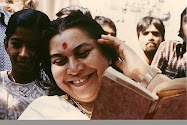Shankaracharya (Sankara) (7/8th century)
This great yogi is
credited with the writing of many philosophical treatises, concluding
ultimately that it was only necessary to praise the Goddess. In his Eight
stanzas to Bhavani, Shankara says
No father have I, nor mother, no comrade,
No son, no daughter, no wife, and no
grandchild,
No servant or master, no wisdom, no calling:
In Thee is my only haven of refuge,
In Thee, my help and my strength, O Bhavani!
Shankara describes the ascent of the Kundalini
in several works, including the Saundarya-lahari:
Thou art
diverting Thyself, in secrecy with Thy Lord, in the thousand-petaled lotus [Sahastrara], having pierced through the Earth situated in
the Muladhara, the Water in the Manipura [Nabhi], the Fire
abiding in the Swadisthana, the air in the heart [Anahat], the Ether
above [Vishuddhi], and Manas
between the eyebrows [Agnya] and thus
broken through the entire Kula path [Sushumna nadi]. (verse 9)
In the Prabodhasudhakara, the need for yoga (union) is described:
He who is
immersed in the ocean of Supreme Bliss is full within and without, like a pot
immersed for a long time in a large deep
cavity of the river Ganga. (verse 164)
In the Tad Niskala (six stanzas on Nirvana), Shankara emphasises
the need for detatchment from the material world when seeking the eternal
bliss:
Om. I am
neither the mind,
intelligence, ego, nor citta [seat of memory]
Neither the
ears nor the tongue,
nor the senses of smell and sight;
Neither ether
nor air
nor fire nor water on earth;
I am eternal
bliss and awareness
-
I am Shiva! I
am Shiva!
He founded four
monasteries, one each in east, west, north and south India, and all successive
heads of these institutions have also used the name ‘Shankaracharya’.
Bibliography
Saundarya-lahari of Sri Sankaracarya, with text, transliteration,
translation and notes, based on Laksmidhara’s Commentary by Swami Tapasyananda (Mylapore: Sri
Ramakrishna Math, 1987)
Aparokshanubhuti or Self-realization of Sri Sankaracarya: text with word-for-word
translation, English rendering and notes by Swami Vimuktananda (Calcutta: Advaita
Ashrama, 1938)
Self-knowledge: an English translation of Sankaracarya’ Atmabodha with
notes, comments and introduction [by] Swami
Nikhilananda (Madras: Sri Ramakrishna Math, 1947)
Prabodhasudhakara: the nectar-ocean of enlightenment [by] Sri
Sankaracarya. Translation
by Samvid (Madras: Samata Books, 1984)
Vivekacudamani of Sri Sankaracarya: text with English translation, notes
and index [by] Swami
Madhavananda (Calcutta: Advaita Ashrama, 2nd ed., 1926)
The
Bhagavad Gita, with the Commentary of Sri Sankaracharya, translated from the
original Sanskrit into English by Alladi Mahadeva Sastry (Mysore, 2nd ed., 1901;
reprint: Madras: Samata Books, 1977)
Madhava-Vidyaranya, Sankara-Dig-Vijaya: the traditional life of Sri Sankacharya, translated
by Swami Tapasyananda (Madras: Sri Ramakrishna Math, 3rd ed., 1986)
Jonathan Bader, Conquest of the Four Quarters - Traditional
Accounts of the Life of Sankara (New Delhi, 2000)
P.George Victor, Life and teachings of
Adi Sankaracarya (New Delhi, 2002)
Natalie Isayeva, Shankara and Indian
philosophy (Albany, NY: State University of New York Press, 1993), esp
chapter 3
Sridevi Rao, Adi Sankaracharya - the
voice of Vedanta (New Delhi, 2003)
T.S.Rukmani, Shankaracharya (New
Delhi, 2000)

No comments:
Post a Comment